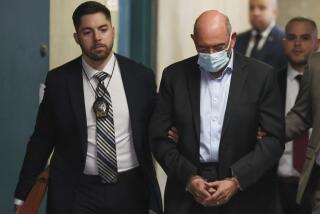Weinberger Denies Guilt in Iran-Contra
- Share via
WASHINGTON — Former Defense Secretary Caspar W. Weinberger pleaded not guilty Friday to five felony charges of lying about notes he kept on the Iran-Contra matter and obstructing criminal and congressional investigations of the worst scandal to mar the Ronald Reagan Administration.
Weinberger took an aggressive stance as his lawyer, Robert S. Bennett, disclosed that he would seek to disqualify chief prosecutor Craig A. Gillen on grounds that “he is a player in this case,” because Weinberger is charged in one count with making false and fraudulent statements to Gillen himself.
Bennett also pressed for an unusually swift trial date, noting that Weinberger is about to turn 75 and that “this investigation has been going on for over five years. This is a tremendous cloud over him.” U.S. District Judge Thomas Hogan set a tentative trial date of Nov. 2--the day before Election Day.
The clearest symbol of the demeaning effect of the proceedings on the most senior Reagan Administration official to be charged in the case came when Weinberger, looking straight ahead and saying nothing, was hustled from the courthouse by his two lawyers to a waiting car. Courthouse guards pushed aside TV camera operators and boom mike carriers as Bennett muttered, “vultures.”
Gillen, the Iran-Contra deputy independent counsel, told Hogan that the government did not plan to submit a superseding indictment--a revised set of charges that prosecutors sometimes use to broaden a case and name additional defendants.
This had appeared to be a possibility in the Weinberger case, because the unusually detailed 31-page indictment refers to the prosecution theory that Reagan Administration officials sought to cover up key elements of the arms-for-hostage deal to protect the President.
Weinberger, immediately after his indictment Tuesday, said he had turned down a prosecution offer to let him plead guilty to a misdemeanor instead of facing felony charges if he would provide evidence against others. The former defense secretary declared he would not give false testimony.
The indictment charged Weinberger with concealing from investigators the fact that he had taken and kept extensive personal notes on high-level Administration discussions about secret U.S. arms sales to Iran in 1985 and 1986 and about aid to the Nicaraguan Contras when Congress had outlawed U.S. support.
Weinberger, secretary of defense from 1981 to 1987, sat on the National Security Council, whose staff oversaw operational aspects of the Iran arms sales and support for the Nicaraguan rebels, the indictment noted. The indictment charged that Weinberger in 1987 concealed from the House and Senate Iran-Contra committees the existence of his personal notes, despite explicit requests by both panels for such material.
Weinberger also was charged with making false statements about those notes to independent counsel investigators. The notes, which filled hundreds of pages, reflected most of the key meetings and discussions described in the indictment, according to the independent counsel.
The episode in which prosecutor Gillen played a central role involved an October, 1990, interview of Weinberger. In it, according to one count in the indictment, Weinberger specifically recalled “not taking any notes during his few meetings with the President and other Cabinet members when the Iranian arms sales matter was discussed.”
“Gillen advised Weinberger that the office of independent counsel has a document, contemporaneously written by someone Weinberger would consider credible, which alleges that Weinberger has withheld some of his notes concerning the Iran-Contra matter,” an FBI agent’s report of the interview stated. “Gillen would not identify the author of the document or further describe the document.”
“Weinberger responded that the allegation is not true, and he is distrustful of the document’s author and his motivations,” the FBI interview report said.
Weinberger’s statements were “false, fictitious and fraudulent,” the indictment charged.
Gillen told Judge Hogan that the effort to oust him from the case will fail because his role in the count against Weinberger does not meet the standard of “compelling necessity” to remove a prosecutor required under federal law. The issue is likely to be decided after the prosecution and defense submit pretrial motions to Hogan in August.
It was the document alleging that Weinberger withheld notes on Iran-Contra from investigators that prompted them to focus on materials he had stored at the Library of Congress under conditions that prevented anyone from examining them without his permission, according to a source familiar with the investigation.
Weinberger’s defenders have contended that he “voluntarily” made those files available to investigators, but a source close to the prosecution said the files were examined only after it became clear that prosecutors had the necessary “probable cause” to subpoena them.
More to Read
Sign up for Essential California
The most important California stories and recommendations in your inbox every morning.
You may occasionally receive promotional content from the Los Angeles Times.










